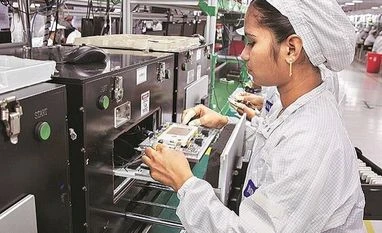Chinese smartphone player Xiaomi is riding on Make in India with its recent supplier investment summit, where it invited global suppliers to set up a local components ecosystem in India, to boost its own brand and give a thrust to the central initiative for manufacturing.
The company says the objective of the summit was to encourage its global partners to set up local manufacturing plants and invest in India. If the plan comes to fruition, it would help Xiaomi as well as boost the electronics manufacturing industry in India, it adds.
Manu Jain, vice-president, Xiaomi, and managing director, Xiaomi India, says, “Make in India is probably the biggest reason for our success in India. Local manufacturing has propelled our growth in India, by aiding us with a demand-supply equilibrium faster. We are committed to the cause and in fact were the first to announce local manufacturing plans under the Make in India initiative. The key is to ensure the quality of products is on a par with global standards.”
While the company did not reveal as to what extent could the setting up of a local components supplier ecosystem could help Xiaomi India to save costs, Jain stresses that the move would enable it to ensure a faster turnaround for all its devices and also help partners in the long run. “The entire reason for Xiaomi to encourage our local suppliers to come to India is to deliver on our philosophy of making innovation available for everyone, and providing it at an honest pricing. We believe our suppliers will be able to help us move one more step in that direction.”
Xiaomi began its Make in India journey in 2015 after announcing its first manufacturing plant in partnership with Foxconn. Currently, the company has five smartphone manufacturing plants with Foxconn and one plant with Hipad technologies. Four of the five smartphone plants with Foxconn are in Sri City, Andhra Pradesh, and one is in Sriperumbudur, Tamil Nadu.
According to Counterpoint Research, Xiaomi went past Samsung to grab the top spot in the Indian smartphone market putting its share at 25 per cent ahead of Korean rival at 23 per cent.
The research firm points out that during the second half of the year, manufacturers such as Xiaomi was particularly disruptive with an aggressively-priced, broad portfolio taken to market with an effective channel expansion strategy. Xiaomi ended Samsung’s six-year market dominance.
Xiaomi claims to have a production capacity of two smartphone per second during operational hours and employs over 10,000 employees, more than 95 per cent of who are women. More than 95 per cent of its Xiaomi smartphones sold in India are manufactured locally.
“We also started a local SMT (surface mount technology) plant in Sriperumbudur for local assembling of PCBA (printed circuit board assembly) in partnership with Foxconn. We hope that by Q3 2018, nearly 100 per cent of Xiaomi smartphones locally manufactured will have a locally assembled PCBA,” Jain said at the supplier investment summit where the company invited more than 50 of its global smartphone component partners.
The company says its decision is a step forward in the government approved phased manufacturing programme (PMP), which is aimed at increasing domestic value addition as part of the Make in India initiative and supported by financial incentives and tariffs.
“We are the mediators in this conversation who are encouraging our partners to come set up local base We set up the summit for our partners to educate them about the smartphone market in India, the state of electronic manufacturing industry, taxation policies, rebates etc. We set up meetings between different states and our partners, and made them meet our existing contract manufacturers to understand their growth in India,” adds Jain.
Tarun Pathak, associate director at Counterpoint Research, says Xiaomi’s PCBA announcement should make it the second largest brand in terms of value addition in India after Samsung, besides increasing the company’s value addition from single digit to 15 per cent now. “This is critical for Xiaomi as sourcing and ironing out supply chain issues is very critical for its product planning. Local value addition in India was 10 per cent in 2017, up from 5.6 per cent in 2016,” he points out.
For other brands, the rate of localisation will depend on the component ecosystem development in India, Pathak says. “As of now most of the key components are still being sourced from China. However, the recent duty hikes indicates that the government will stick with its phased manufacturing programme policy and open to support new component supplier setting up their manufacturing base in India.”
Notably, the government had recently announced imposing a 10 per cent basic customs duty on import of components such as camera modules and PCB assemblies.
Asked whether the local component supplier ecosystem would help differentiate its products, Jain says the company strives to provide the best specifications in products with high quality and at an honest price to users. “Even with local manufacturing of components, our product offerings would continue to adhere to international standards as these are our global suppliers.”
Invitation to invest
- Xiaomi’s recent supplier investment summit taught global suppliers about the smartphone market in India, electronic manufacturing industry, taxation policies
- Its decision is a step forward in the government approved phased manufacturing programme, which is aimed at increasing local value addition as part of Make in India and with financial support
Unlock 30+ premium stories daily hand-picked by our editors, across devices on browser and app.
Pick your 5 favourite companies, get a daily email with all news updates on them.
Full access to our intuitive epaper - clip, save, share articles from any device; newspaper archives from 2006.
Preferential invites to Business Standard events.
Curated newsletters on markets, personal finance, policy & politics, start-ups, technology, and more.
)